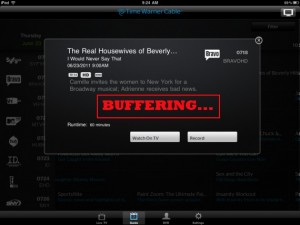 While Netflix has grown like wildfire across Canada, providing unlimited streamed video entertainment for $8 a month, a few cable operators at risk of premium channel cord-cutting have responded with their own movie streaming services, at least one that temporarily found itself the subject of controversy when it was introduced a few weeks ago.
While Netflix has grown like wildfire across Canada, providing unlimited streamed video entertainment for $8 a month, a few cable operators at risk of premium channel cord-cutting have responded with their own movie streaming services, at least one that temporarily found itself the subject of controversy when it was introduced a few weeks ago.
Shaw Communications’ Movie Club is that cable company’s answer to Netflix — offering a flat rate streaming service available over broadband or through your Shaw set top cable box for $17 a month ($12 if you forgo HD movies). For that, Shaw promises unlimited viewing, without any usage caps so long as you stream movies from your cable box and not from your home computer.
But is it worth it?
With the assistance of one of our readers in Calgary, we were able to give Shaw’s Movie Club a trial run.
Availability
Evidently, Shaw Movie Club works best if you live in Calgary or Edmonton, where Shaw has been testing their new “Gateway” system, which is a combination home video terminal/DVR designed to compete with phone company DVR boxes which can record 4-6 shows simultaneously and deliver recordings to multiple sets in the home. A number of Shaw customers on less-advanced, older cable systems may find the service a lot less convenient to use. Outside of urban Alberta and in British Columbia, we found instances where customers could request to view Shaw Movie Club titles, but they had to be watched on your cable set top box. For now, the most aggressive marketing for the service seems to be in Calgary and Edmonton, perhaps for this reason.
The Selection
When we sampled the service, we found about 150 titles available for viewing — hardly a wide selection. Although many popular, semi-recent movies were available for viewing, the selection was comparable to what one would find from one or two premium movie channels. Existing premium subscribers may find more than enough to watch from Super Channel or Movie Central On Demand, which are included with your subscription to one or both networks. In the States, HBO, Cinemax, and Showtime all offer their own virtual “on-demand” channels that let viewers select most of the titles shown on each respective network for instant, on-demand viewing. Shaw Movie Club felt very much like one of these channels, based on the limited selection.
In comparison, Netflix does not make it easy to count the actual number of streamed movies they have on offer at any one time, but the selection was clearly more substantial on Netflix, with a much deeper catalog. But Canadians are also punished by Netflix because the service does not yet have agreements in place with studios to stream the same titles to both American and Canadian audiences. Americans have a much larger selection of titles to stream. Shaw’s agreements with studios clearly emphasize more current titles, and there are titles available on Shaw’s service that are not available from Netflix.
Winner: Netflix – You have a better chance of finding something to watch on Netflix.
Loser: Shaw Movie Club – But the service may have access to movies you wish Netflix provided.

Shaw's biggest competitor
The Value
At up to $17 a month, Shaw Movie Club is expensive. In fact, it’s a lot more expensive if you do not subscribe to Shaw’s cable television. It’s required to sign up for the streaming service. That seems counter-intuitive to provide video streaming but deny broadband-only customers the opportunity to buy, but not when you consider such services are designed to prevent cable-TV cord cutting, not enable it. Shaw charges nearly $40 in Alberta for basic cable service, so that’s a steep entry fee to pay before handing over another $12-17 just to stream movies.
For those uncomfortable video streaming on home computers, Shaw’s set top box solution lets you watch shows on-demand directly on your television.
Shaw initially found itself mired in controversy when it appeared they would exempt their video streaming service from their own usage caps — a clear anti-competitive move against Netflix, which does count against your cap. But Shaw quickly clarified their position to state only set top box viewing was exempt from their caps. We’re not certain exactly what distinction Shaw is trying to make beyond the political, because data is data — it all arrives on the same cable. Shaw would argue their video may travel over their “television” bandwidth when delivered to set top boxes and their broadband network when delivered over the Internet. But Time Warner Cable has shown it can deliver video over its Apple iPad app to cable subscribers over Time Warner’s internal network, which means it costs next to nothing to provide. We suspect there is nothing technically precluding Shaw from exempting all of its Movie Club viewing from usage caps, beyond the political implications of doing so.
Winner: Netflix – $7.99 a month is an afterthought when you consider how much you can watch.
Loser: Shaw Movie Club – Up to $17 a month is a very steep price to pay for fewer than 200 movie titles to watch.
Video Quality
 Both services delivered high quality video, even over a remote connection we used to sample Shaw Movie Club. Shaw’s HD streaming performed with absolutely no technical flaws, evidence they are paying careful attention to deliver video from networks as close to their customers as possible. Shaw’s HD streaming was often better than Netflix’s online streaming, but Netflix’s network consumes a lot less bandwidth, an important distinction if you have a large family piling on your broadband connection at the same time. Shaw’s video is a bandwidth piggy, and will eat into your usage allowance fast if you use it over the Internet.
Both services delivered high quality video, even over a remote connection we used to sample Shaw Movie Club. Shaw’s HD streaming performed with absolutely no technical flaws, evidence they are paying careful attention to deliver video from networks as close to their customers as possible. Shaw’s HD streaming was often better than Netflix’s online streaming, but Netflix’s network consumes a lot less bandwidth, an important distinction if you have a large family piling on your broadband connection at the same time. Shaw’s video is a bandwidth piggy, and will eat into your usage allowance fast if you use it over the Internet.
We recommend watching Shaw’s service over your existing set top box whenever possible. It’s convenient and won’t count against your usage allowance.
A Tie: Netflix and Shaw Movie Club both deliver excellent quality video with no technical flaws experienced. Shaw Movie Club has a larger selection of HD movies, but that is tempered by the fact watching them will rapidly erode your usage allowance if watching online.


 Subscribe
Subscribe








